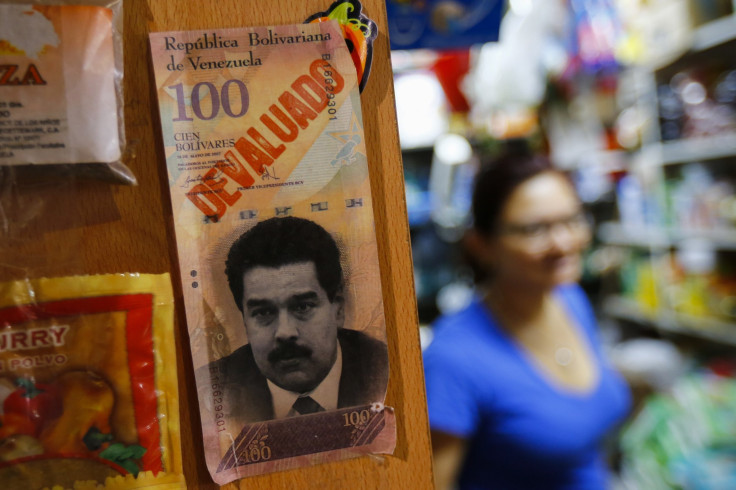One Year After Deadly Protests, Venezuela Goes From Bad To Worse

It’s been a year since Venezuela erupted in political protests that rattled the government of President Nicolás Maduro. But today the country is in an even more fraught position: The drop in global crude oil prices has exacerbated shortages; the currency loses value daily; government debt is ballooning; and violent crime rates remain among the world's highest. Further, it doesn’t look like these problems will ease up anytime soon.
Students led marches Thursday in Caracas and the western city of San Cristobal – the focal point of last year’s protests – to honor those who died in the Feb. 12, 2014, demonstrations. Confrontations between protesters and security forces turned violent, with students throwing rocks and Molotov cocktails at police and National Guard soldiers firing tear gas at the crowds.
While Thursday’s protests focused largely on those who died last year, wider discontent over the country’s economic fortunes – which fueled last year’s demonstrations -- remain palpable. Maduro’s approval rating has plummeted over the past year, down to just 22 percent, according to polling firm Datanalisis.
Oil exports provide the bulk of Venezuela’s foreign reserves, and the dramatic drop in global crude oil prices -- down 60 percent since last June -- has sent Caracas scrambling to manage a cash crunch amid widespread speculation that it may default on its debt this year. This week, Standard & Poor’s downgraded Venezuela’s long-term credit rating to CCC, a ranking that in financial circles is known as "junk." Further, S&P projected that Venezuela's gross domestic product will contract 7 percent this year and inflation – which averaged a whopping 64 percent last year -- could rise to 100 percent.
Maduro has been working on some fixes: Venezuela’s retail gasoline prices, which are the world’s cheapest at just around 4 cents a gallon, are set to rise in the coming months. The government also rolled out a new currency exchange market Tuesday to ease strict currency controls and mitigate the gap between the official rate, 6.3 bolivars to the U.S. dollar, and the black market rate, which, according to financial website DolarToday, stands around 186 bolivars to the dollar. But it wasn’t enough for investors: Bonds fell Wednesday as critics labeled the government’s move insufficient to handle the deep cash shortage.
The currency crunch has hit supermarkets hard, leaving residents waiting for hours in line to buy hard-to-find goods. Flour, toilet paper and even condoms have become scarcer in a country where regular shortages were already a fact of daily life.
Meanwhile, the government has gone on the offensive to denounce an “economic war” perpetrated by opposition groups, U.S. media and even supermarket owners themselves. Last week Maduro announced that the Dia a Dia supermarket chain would be nationalized, accusing employees of hoarding. The move came just days after officials arrested executives from pharmacy chain Farmatodo for allegedly trying to destabilize the economy.
Relations between Caracas and Washington, which weren’t exactly friendly during the administration of former President Hugo Chavez, haven’t fared much better over the past year. In the midst of Thursday’s protests, Maduro announced that 11 members of the national air force had been arrested for an alleged assassination attempt, supposedly backed by the U.S. government. He accused the officers of planning to bomb the presidential palace with a military jet, a claim Washington called “laughable,” according to the Associated Press. It didn’t help that U.S. Vice President Joe Biden, whom Maduro had accused directly of planning to overthrow his government, met with members of Venezuela’s opposition just a day before.
It’s unclear when Venezuela’s ailing economic fortunes might turn around, particularly since there’s no sign that global oil prices will spike up again soon. But the widespread discontent could manifest itself in parliamentary elections scheduled for the end of this year. Venezuela’s opposition has been notoriously fragmented and previously failed to capture support from the poor, who have been the most fervent supporters of the socialist policies Chavez championed. But if the opposition wins, leaders have pledged to back constitutional measures to push Maduro out of office, which could potentially put the country on a pathway to even more volatility next year.
© Copyright IBTimes 2024. All rights reserved.












